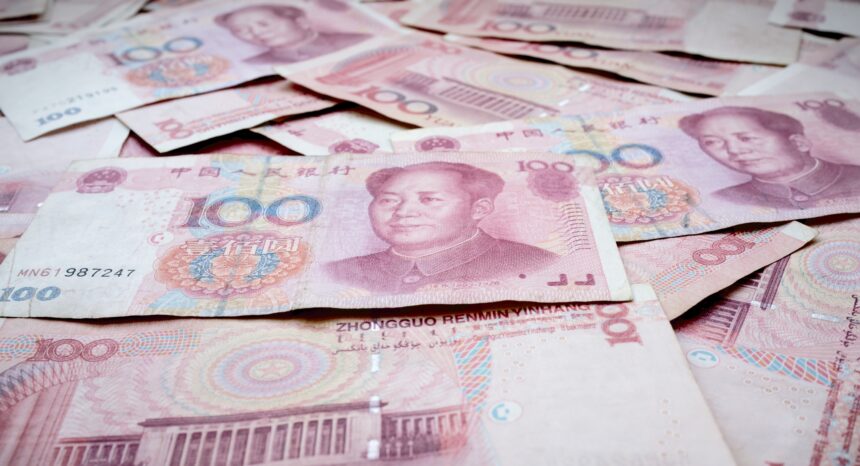The U.S.-China trade war entered new territory when President Donald Trump last week ordered more tariffs on $300 billion worth of goods from China.
Ordering tariffs was nothing new. What was different was how China responded.
China allowed the exchange rate between the yuan and the dollar to cross a 7-to-1 threshold that many media outlets are calling “psychologically important.”
What does psychology have to do with currency exchange? A lot. And foreign exchange prices can have real consequences for things that really matter, like Americans’ retirement savings.
“The qualifier is ‘psychological,’” says Saule Omarova, who studies international finance and is director of the Clarke Program on the Law and Regulation of Financial Institutions and Markets at Cornell University. “There is nothing mandatory about a 7-to-1 exchange rate and there is nothing hardwired about it.”
How China and the U.S. affect currency exchange rates
The People’s Bank of China is the central bank in China. Each day it sets an exchange rate for the renminbi — that’s what China’s currency is called. The yuan is the unit of measurement for the renminbi. But “yuan” is commonly used to refer to both the currency and unit of measurement.
The U.S. takes a more indirect approach in setting currency exchange rates. The central bank in the U.S., the Federal Reserve, sets the federal funds rate. This rate is the amount U.S. banks charge one another for short-term borrowing, and it’s the rate the Federal Reserve cut last week. It can affect interest rates on financial products, like home mortgages, and can affect prices in markets, such as the foreign exchange.
Even though the People’s Bank can set exchange rates for the yuan at any level, it must still consider the health of China’s economy. For example, a weaker currency can boost exports – to an extent. Keith Bradsher, Shanghai bureau chief for The New York Times, explains:
“Say you own a Chinese factory making lawn ornaments, and you sell a lot of pink flamingos to an American retailer. You price each at $1 — they may sell for far more in retail outlets in the United States, but shipping and storage account for most of that. When the renminbi is 6 to the dollar, that translates to 6 renminbi in sales.
But when the currency depreciates to 7 to the dollar, that $1 flamingo is worth 7 renminbi in sales to you. Or you can cut the price — say, from $1 to 85.7 cents — and still make your original 6 renminbi in sales. Your American competitor, who has to buy and sell in dollars, has to grudgingly cut prices to compete.”
If the People’s Bank is too aggressive in weakening the yuan, however, that can rattle markets, Omarova says.
Take what happened Aug. 5: after the yuan-dollar exchange rate ratio bumped up over 7 to 1 and the U.S. designated China as a currency manipulator, the Dow Jones Industrial Average dropped 767 points, losing almost 3% of its value.
A psychologically important threshold
Psychology kicked in because currency traders came to expect a certain level of stability in the price of the yuan. For more than a decade, the People’s Bank had kept its daily reference rate — those day-to-day changes in the yuan’s exchange rate — between 6 and 7 yuan per dollar.
“They’ve decided it’s probably the closest they can get to what might be, in economists’ expectations, the natural or proper rate of exchange between the dollar and renminbi,” Omarova says. “What they’ve been doing is managing the daily reference rate for 10 years, so it fluctuates but never breaks through this 7-to-1 threshold.”
When rates did break through on Aug. 5, it was a psychological shock to traders on the foreign exchange market. The exchange ceiling they had come to expect was no longer there.
Bigger than the Dow, bigger than psychology
Other than wealthy investors, people who care about the yuan-dollar exchange rate might include the tens of millions of Americans with 401(k) retirement plans. These plans are the major source of retirement savings for many Americans, and their value is tied to financial markets.
So, when a “psychologically important” threshold is crossed there can be real consequences for 401(k) plan holders. The effects on a particular 401(k) will depend on how assets are allocated — the balance a plan holder chooses between securities and bonds. But again, broadly, 401(k) values will take a hit when the Dow sinks. Bonds aren’t immune, though. Interest rates on long-term bonds also have fallen over the last week or so.
“What we need to realize is there is structural dysfunction in our financial system,” Omarova says. “Values of so many financial assets are ultimately tied to these particular pricing points that seem to be far removed from what we see on the surface.”


Expert Commentary